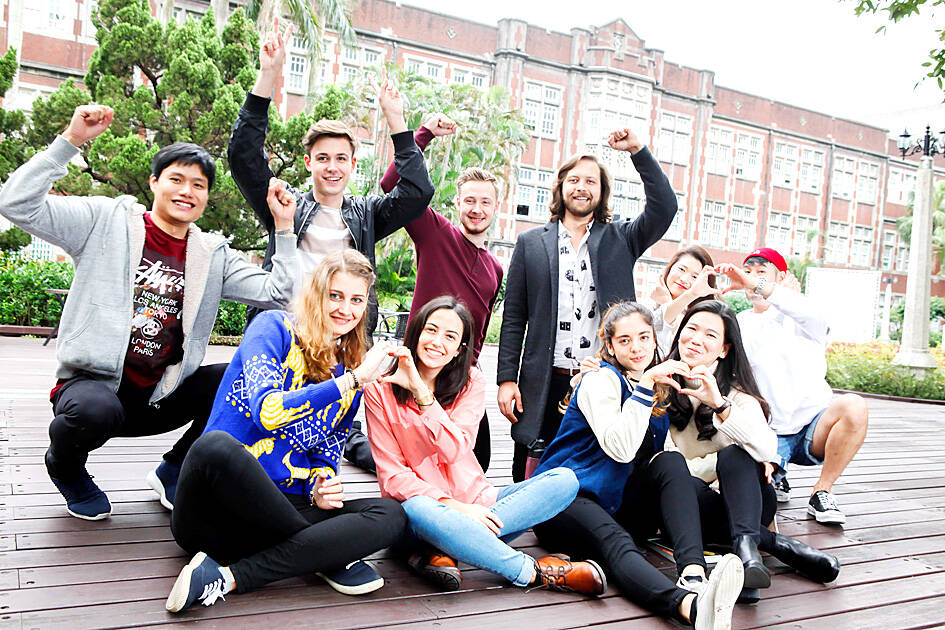The number of foreign students in the nation’s colleges and universities hit a five-year high last year, with National Taiwan Normal University (NTNU) topping the list with the most international students, Ministry of Education data showed.
Last year, 123,188 international students attended Taiwanese colleges and universities, 3,259 more than the previous academic year, the data showed.
NTNU had the most international students, with 7,648 students, followed by the National Taiwan University’s 6,249, it showed.

Photo courtesy of the National Taiwan Normal University
NTNU yesterday said that international students accounted for 12.05 percent of its degree students last year.
The percentage of overseas Chinese students at the university has also been the highest among universities in Taiwan for many years, increasing 6.65 percent last year compared with the previous year, it added.
NTNU president Wu Cheng-chih (吳正己) said the university’s success in attracting international students was due to careful planning and the implementation of three main strategies: bilingual education, a talent recruitment and retention strategy, and a campus internationalization strategy.
Facing the challenges of global competitiveness and a low domestic birthrate, the university has focused on promoting bilingual education, and since 2021 launched English as a medium of instruction (EMI) programs for undergraduate and graduate students, as well as increased the number of EMI courses and course capacities, he said.
NTNU now has six EMI undergraduate degree programs and 62 EMI postgraduate degree programs, with a total of 886 EMI courses available per year, Wu said, adding that it would continue to develop EMI courses.
The university attends international education fairs, produces student recruitment videos in multiple languages, pursues a global social media marketing campaign, and offers diversified programs and support for international students, he said.
More than 1,700 international students are enrolled at NTNU, he said, adding that the university assists them with employment counseling and internship recruitment in Taiwan.
Eighty-two international students who graduated between 2022 and last year stayed in Taiwan to work, he said.
To internationalize the campus and enhance administrative support and cultural integration, NTNU established an international students’ support office, offering comprehensive life and academic support to foreign students, he said.
The university also created specialized Mandarin language courses to help international students overcome the language barrier, Wu said, adding that NTNU had helped nearly 3,000 international students improve their Mandarin language skills since 2021.
The school plans to recruit one international administrative staff each year to help provide language and mental health support to foreign students, he said.
The construction of a specialized dormitory for Mandarin-language learners is to be completed in 2027, he said.
The university’s Academy of Preparatory Programs for Overseas Chinese Students is the only such program in Taiwan, and last year 76.5 percent of the students were from Myanmar and 8.66 percent from Indonesia, NTNU said.
Its Mandarin Training Center also had more than 5,000 international students from more than 90 countries last year.

Taiwan has received more than US$70 million in royalties as of the end of last year from developing the F-16V jet as countries worldwide purchase or upgrade to this popular model, government and military officials said on Saturday. Taiwan funded the development of the F-16V jet and ended up the sole investor as other countries withdrew from the program. Now the F-16V is increasingly popular and countries must pay Taiwan a percentage in royalties when they purchase new F-16V aircraft or upgrade older F-16 models. The next five years are expected to be the peak for these royalties, with Taiwan potentially earning

STAY IN YOUR LANE: As the US and Israel attack Iran, the ministry has warned China not to overstep by including Taiwanese citizens in its evacuation orders The Ministry of Foreign Affairs (MOFA) yesterday rebuked a statement by China’s embassy in Israel that it would evacuate Taiwanese holders of Chinese travel documents from Israel amid the latter’s escalating conflict with Iran. Tensions have risen across the Middle East in the wake of US and Israeli airstrikes on Iran beginning Saturday. China subsequently issued an evacuation notice for its citizens. In a news release, the Chinese embassy in Israel said holders of “Taiwan compatriot permits (台胞證)” issued to Taiwanese nationals by Chinese authorities for travel to China — could register for evacuation to Egypt. In Taipei, the ministry yesterday said Taiwan

Taiwan is awaiting official notification from the US regarding the status of the Agreement on Reciprocal Trade (ART) after the US Supreme Court ruled US President Donald Trump's global tariffs unconstitutional. Speaking to reporters before a legislative hearing today, Premier Cho Jung-tai (卓榮泰) said that Taiwan's negotiation team remains focused on ensuring that the bilateral trade deal remains intact despite the legal challenge to Trump's tariff policy. "The US has pledged to notify its trade partners once the subsequent administrative and legal processes are finalized, and that certainly includes Taiwan," Cho said when asked about opposition parties’ doubts that the ART was

If China chose to invade Taiwan tomorrow, it would only have to sever three undersea fiber-optic cable clusters to cause a data blackout, Jason Hsu (許毓仁), a senior fellow at the Hudson Institute and former Chinese Nationalist Party (KMT) legislator, told a US security panel yesterday. In a Taiwan contingency, cable disruption would be one of the earliest preinvasion actions and the signal that escalation had begun, he said, adding that Taiwan’s current cable repair capabilities are insufficient. The US-China Economic and Security Review Commission (USCC) yesterday held a hearing on US-China Competition Under the Sea, with Hsu speaking on